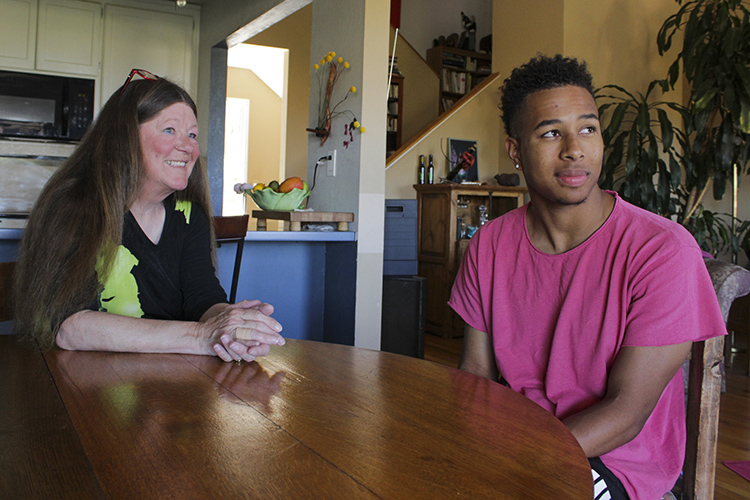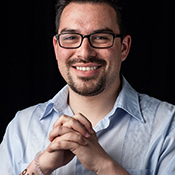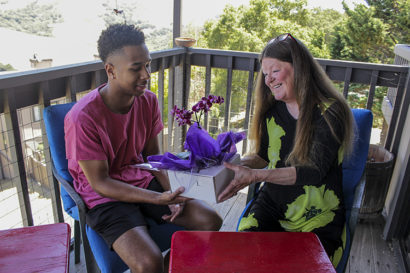For students experiencing housing instability, Safe Time opens doors
A free service started by a Berkeley alum offers short-term housing to students with limited options available
June 27, 2018

UC Berkeley student Cameron Rentie (right) visits with his Safe Time host Teryl Burt (left) at her home in El Cerrito in 2018. Burt hosted Rentie through Safe Time after he was unable to find housing after transferring to Berkeley prior to fall orientation in 2017. (UC Berkeley photo by Jeremy Snowden)
Before classes started in the fall of 2017, Cameron Rentie needed a place to live. Rentie was a transfer student, new to Berkeley and the Bay Area, and was caught completely off guard by the competitive housing marking around campus. The housing challenges that he faced are not unusual.
The same year Rentie came to campus, an Office of Planning and Analysis survey was given to nearly 39,000 UC Berkeley undergraduates, graduate students and postdocs found that 10 percent of those who responded identified as “not having stable or reliable housing.” Most of them said they got through a period of housing instability by couch surfing. Chuck Grant, a UC Berkeley alum, has another idea for how to help.
Grant has launched Safe Time, a startup that matches hosts who have extra space in their homes with people experiencing housing instability, often on the verge of homelessness. The service is free and open to anyone who qualifies.
Three UC Berkeley students — including Rentie — have already been housed by Safe Time hosts, and Grant believes that his organization could help alleviate some of the housing burdens that Berkeley students face.
Grant’s vision for Safe Time is not as a solution for people who are already homeless. Instead, he sees it as a way to help those who are on the cusp of becoming homeless by giving them a free place to stay while they regroup. The length of the stay is agreed upon by the guest and the host and can be a brief as a week or as long as six months.
“Our program focuses on near-homelessness and prevention,” says Grant. “We’re taking on people who are about to become homeless because of an eviction, family break-up or just being a poor student who can’t afford Berkeley rents.”

UC Berkeley alum and Safe Time founder Chuck Grant (Photo courtesy of Chuck Grant)
To qualify for Safe Time, guests must pass a background check, be addiction-free, in good mental and physical health and have a clear path back to stable housing. Students are excellent candidates, says Grant, who thinks Safe Time might be a better option than short-term rentals, motels, single-room-occupancy facilities, vehicles or non-residential campus buildings — all of which students identified as solutions in the Office of Planning and Analysis survey.
Safe Time’s first placement was in May 2017. Since then, 27 other people have been housed by Safe Time hosts.
The rent is too damn high
“We know a lot less than we need to about student housing instability,” says Ruben Canedo, chair of the campus’s Basic Needs Committee. “There could be any number of reasons why a student could find themselves homeless. It’s not as simple as saying, ‘Students are homeless because they messed up,’ which, unfortunately, is the most common assumption,” says Canedo. “People blame students for their homelessness.”
UC Berkeley attracts students from across the globe, adds Canedo, and not all of them are familiar with the Bay Area’s expensive and competitive housing market.
“Across the state, the nation, even internationally, if you’re coming to the Bay for the first time and you’re not from a high-income background, you’re going to struggle,” says Canedo.
Although there is no formal relationship between Safe Time and the campus, the Basic Needs Committee has reached out to Safe Time to help students facing housing instability.

Ruben Canedo of the Basic Needs Committee
“I was looking for apartments, I was looking for roommates,” Rentie says of his first weeks in Berkeley. “I couldn’t find anything. I only had one contact at UC Berkeley and when I reached out to her, she mentioned this program called Safe Time.”
In the weeks before classes started, Rentie was able to find an apartment, but was unable to move in until after the beginning of the semester. He needed a place for ten days. Instead of paying for a hotel, he met with Teryl Burt, a Safe Time host with an extra bedroom in her home in the El Cerrito hills. They got along well, and both parties agreed that Rentie would move into her home.
“We were really panicking there for a minute,” Rentie recalls. “I just didn’t expect the housing situation to be this bad. I thought I was going to be able to find an apartment or roommate pretty easily, but the places that were available were way too expensive. I didn’t understand the craziness of the housing situation here.”
Burt has hosted Safe Time guests six times and says that she was surprised to learn that students at Berkeley were struggling to secure housing.
“I didn’t know it was an issue for Cal students,” says Burt. “Initially I had a rule against it. I mean, they’re Cal students, they’re smart and can take care of something like this, right? But I’ve changed my mind on that after doing some more research. It really is a serious challenge.”
Limited hosts

Cameron Rentie (left) returned to Teryl Burt’s home in El Cerrito with a gift of appreciation. Burt hosted Rentie for 10 days in the fall of 2017 through Safe Time (UC Berkeley photo by Jeremy Snowden)
While there is no shortage of potential guests, coming up with volunteers willing to open their doors is Safe Time’s most significant challenge. When it comes to Berkeley students, however, Grant is hopeful that the greater UC Berkeley community — alums in the Bay Area, as well as faculty and staff — will remember their own difficulties in college and open their homes.
“This program works,” says Grant. “It’s working now on a smaller scale than I would like. I’d like to be helping more people.”
Canedo also emphasizes the need to engage the broader campus community in this issue.
“I can’t stress enough how important alumni are with this,” says Canedo. “They have the most intimate relationship with the student experience here. Having engaged alumni in the Bay Area is essential for our goals.”
For the time being, Grant does not intend to change the model of Safe Time to provide incentives for hosts.
“This is an act of charity,” says Grant. “It costs you nothing, it makes you feel great, it makes your life more interesting, and yes, it probably gives you a little heartache too.”